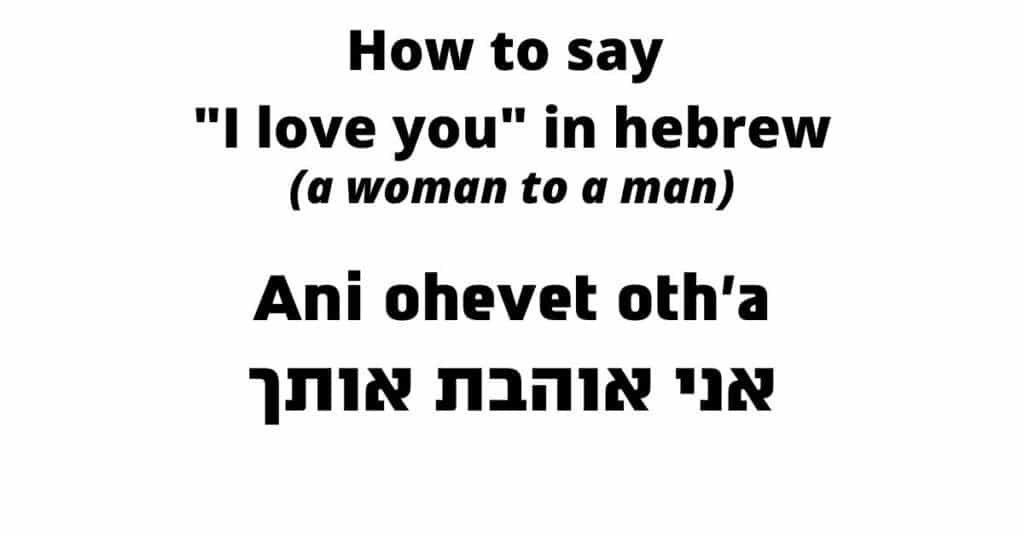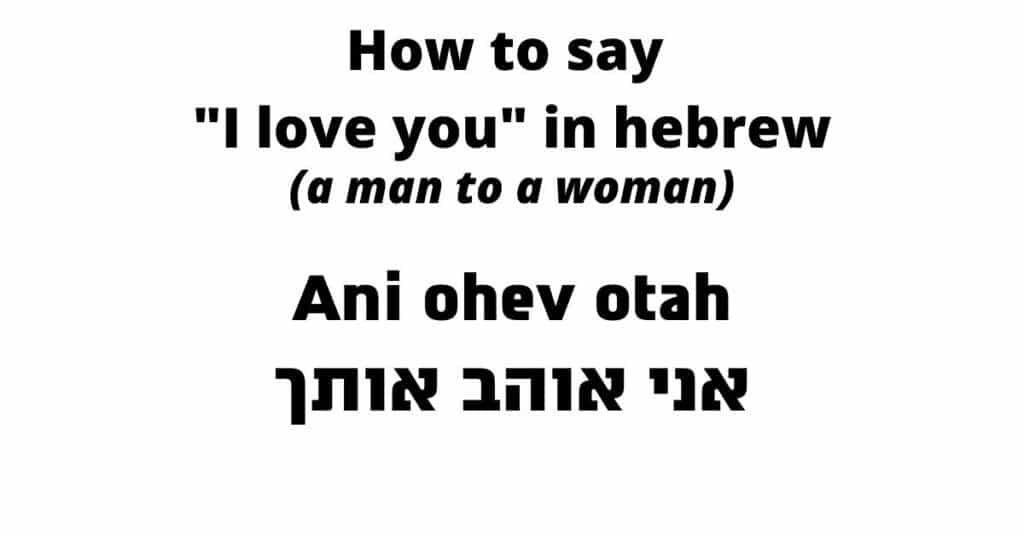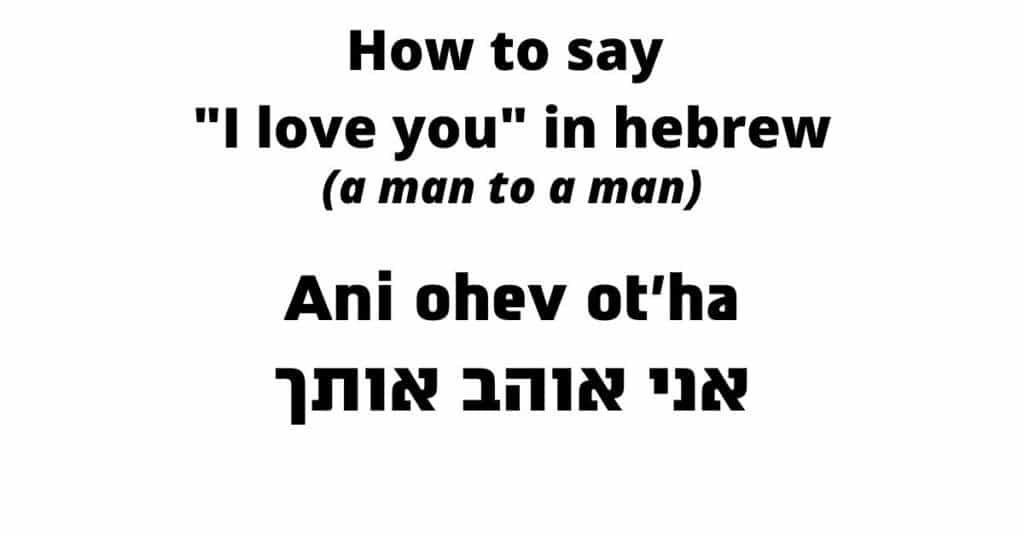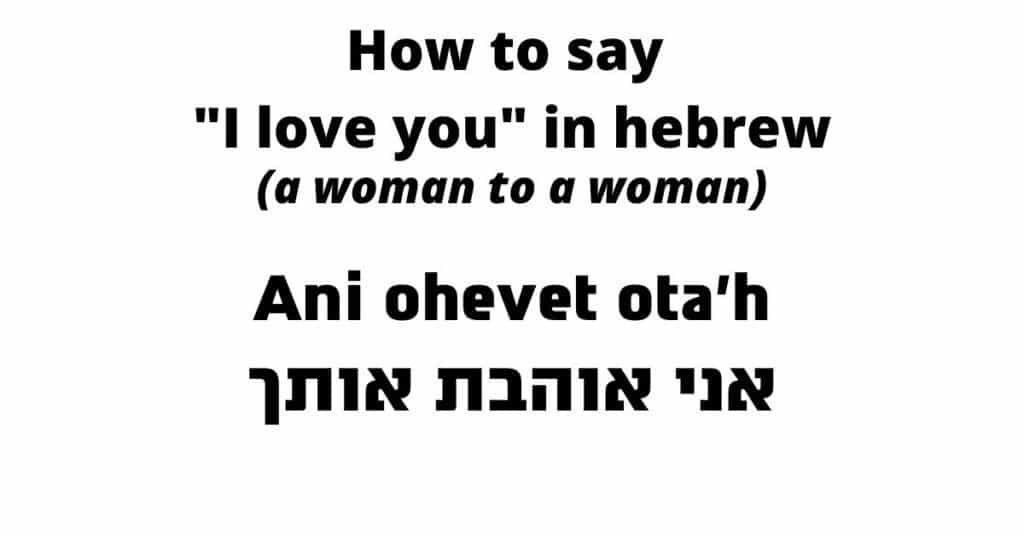Learning how to say “I love you” in a different language adds a special touch to any relationship. Whether you fell in love in Israel, are planning a trip, or simply want to expand your linguistic skills, this guide will teach you how to express your affection in Hebrew.
 Saying I love you in Hebrew
Saying I love you in Hebrew
Saying “I Love You” in Hebrew: Gender Matters
Unlike English, the Hebrew phrase for “I love you” changes based on the gender of the speaker and the person being addressed. Let’s break down the different variations:
From a Woman to a Man:
A woman saying “I love you” to a man says: Ani ohevet oth’a (אני אוהבת אותך).
From a Man to a Woman:
A man saying “I love you” to a woman says: Ani ohev otah (אני אוהב אותך). Surprise your girlfriend by writing it to her!
 Saying I love you from a man to a woman
Saying I love you from a man to a woman
From a Man to a Man:
A man saying “I love you” to another man says: Ani ohev ot’ha (אני אוהב אותך).
 Saying I love you from a man to a man
Saying I love you from a man to a man
From a Woman to a Woman:
A woman saying “I love you” to another woman says: Ani ohevet ota’h (אני אוהבת אותך).
 Saying I love you from a woman to a woman
Saying I love you from a woman to a woman
Phonetic Pronunciation of “I Love You” in Hebrew
While the Hebrew script is beautiful, it can be intimidating for beginners. Here’s a phonetic guide to help you pronounce each variation:
- Ani ohev otah: Ah-nee oh-hev oh-tah
- Ani ohevet oth’a: Ah-nee oh-he-vet ot-ah
- Ani ohev ot’ha: Ah-nee oh-hev ot-ha
- Ani ohevet ota’h: Ah-nee oh-he-vet oh-tah
Expressing Deeper Affection: “I Love You So Much” in Hebrew
To express even stronger feelings, you can say “I love you so much” in several ways:
- Ani ohev/ohevet ot’ha/otah meod (אני אוהב/אוהבת אותך/אותך מאוד): This translates directly to “I love you very much.” Use the appropriate masculine or feminine form.
- Ani ohev/ohevet ot’ha/otah amon (אני אוהב/אוהבת אותך/אותך המון): This phrase emphasizes a vast amount of love.
- Ani met alai’h/alaiha (אני מת עליך/עליך): A more passionate expression, translating to “I’m dying for you.” Note the change in pronoun for male/female recipient.
- Ani holeh alai’h/alaiha (אני חולה עליך/עליך): Similar to the previous phrase, meaning “I’m sick for you,” conveying intense love.
Understanding the Verb “To Love” in Hebrew
The Hebrew verb for “to love” is le’ehov (לאהוב). In the present tense, it conjugates as follows:
- Ani ohev (אני אוהב): I love (masculine speaker)
- Ani ohevet (אני אוהבת): I love (feminine speaker)
- Hem ohavim (הם אוהבים): They love (masculine plural)
- Hen ohavot (הן אוהבות): They love (feminine plural)
Beyond “I Love You”: Essential Hebrew Phrases
While “I love you” is a significant phrase, starting with basic greetings can build a strong foundation for communication:
- Shalom (שלום): Hello
- Toda (תודה): Thank you
- Baruch Aba (ברוך הבא): Welcome
Learning Hebrew enriches your understanding of Israeli culture and allows you to connect with people on a deeper level. Start with these phrases and continue exploring the beauty of the Hebrew language.
